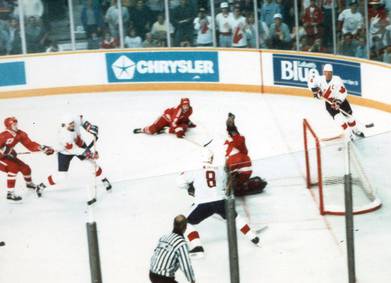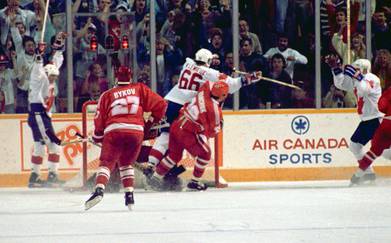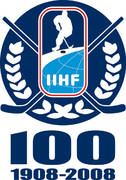

Story #20 Canada Cup '87 – 99 & 66 perform pure magicSeptember 15, 1987 — Hamilton, Canada
Although the history of hockey has many touchstones for any ideal of greatness, there was arguably no finer hockey ever played than in the best-of-three finals of the 1987 Canada Cup between the host nation and the Soviet Union. Of course, there have been other exceptional moments in the game. But 1987 had it all. It featured games in the modern era, where every minute of every game could be captured on film and appreciated time and again and compared to other great modern moments; it had familiar players; it had late-game heroics; and, most of all, it featured a pure level of skill that has never been matched before or since.  In game one, Mike Gartner scored early for Canada but by the end of the first period the Soviets led 3-1 and were in control. The teams exchanged goals in the second, and this set the stage for a dramatic comeback by Canada in the final 20 minutes. Indeed, Canada scored three times to take a 5-4 lead, and it was Andrei Khomutov that tied that game at 17:33 to force overtime. The nailbiting fourth period didn’t last long, but it was played at ferocious speed and both teams had chances to win. However, it was Alexander Semak at 5:33 that scored to give the Soviets a win in the first game.  Then the extraordinary happened. Gretzky moved the puck up ice after a faceoff deep in the Canada end, and as he got to the faceoff circle in the Soviets’ end he dropped the puck to Lemieux, trailing on the play. Lemieux had defenseman Larry Murphy in a perfect position to his right, but he later admitted that he never even thought about making this pass. About the Top 100 StoriesAs part of the IIHF's 100th anniversary celebrations, www.IIHF.com is featuring the 100 top international hockey stories from the past century (1908-2008). Starting now and continuing through the 2008 IIHF World Championships in Canada, we will bring you approximately three stories a week counting down from Number 100 to Number 11.
The Final Top 10 Countdown will be one of the highlights of the IIHF's Centennial Gala Evening in Quebec City on May 17, the day prior to the Gold Medal Game of the 2008 World Championship.
These are the criteria for inclusion on this list: First, the story has to have had a considerable influence on international hockey. Second, it has to have had either a major immediate impact or a long-lasting significance on the game. Third, although it doesn't necessarily have to be about top players, the story does have to pertain to the highest level of play, notably Olympics, World Championships, and the like. The story can be about a single moment — a goal, a great save, a referee's call — or about an historic event of longer duration — a game, series, tournament, or rule change. |
 Click here for the 100 Top Stories
|
|






